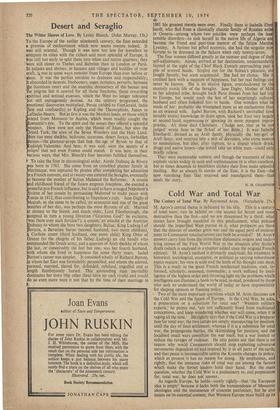Cold War and Total War
The Century of 'Dotal War. By Raymond Aron. (Verschoyle. 25s.) M. A.BoN's central theme is indicated by his title. This is a century of total wars; two lie behind us—the second far fiercer and more destructive than the first—and we are threatened by a third: what causes have brought mankind to this predicament, what policies should the imperilled West pursue in it, what prospects are there that the disaster of another great war and the equal peril of enslave- ment to Communist totalitarianism can both be avoided? M. Aron's answers carry him from the immediate diplomatic origins and under- lying causes. of the First World War to the situation after Stalin's death (which is analysed in a chapter added since the original French edition). M. Aron's method is primarily analytical; his treatment is historical, sociological, economic, or political as varying subordinate topics require; his view is wide and the knife of his thought cuts deep. This is a study in the great French intellectual tradition, cool, in- formed, scholarly, reasoned, reasonable; a work suffused by intel- ligence of the highest order and throwing light on the problems which intelligence can illumine; a book to be read, re-read, pondered by those who seek to understand the world of today or have responsibility for shaping opinion or framing policy.
• Two of the most important questions which M. Aron discusses are the Cold War and the future of Europe. Is the Cold War, he asks, a preparation or a substitute for total war? 'Western military experts,' he points out, 'are not sufficiently freed from tradition conceptions, and keep wondering whether war will come, when it raging all the time.' He rightly says that if the Cold War is a prepara- tion for total war, the two camps are simply manceuvring for position until the day of final settlement, whereas if it is a substitute for total war, the propaganda battles, the skirmishing for position, and the localised small wars constitute the war itself, but a war limited to reduce the ravages of violence. He also points out that there is no reason why world Communism should stop exploiting subversive movements dependent on and inspired by it in all parts of the earth, and that peace is inconceivable unless the Kremlin changes its policy, which at present it has no reason for doing. lje emphasises, and rightly, that the immense risks of total war are among the factors which make the Soviet leaders hold their hand. But the main question, whether the Cold War is a preliminary to, and preparation for, total war, he does not answer.
As regards Europe, he holds—surely rightly—that 'the European idea is empty' because it lacks both the transcendence of Messianic ideologies and the immanence of concrete patriotism; but he also insists on its essential content, that Western Europe must build up its
military strength, which can only emerge from a reconciliation be- tween France and Germany— the prospects of which are now, alas! gravely imperilled. And he asks the crucial question—have Europeans retained faith in their own system of values?—but once more he does not answer it.
The questions which M. Aron does not answer go to the heart of the weakness which make his book a diagnosis coupled with a measure of prognosis, but which prevent it from being the prescription which the West most deeply needs. It is a weakness from which M. Mon suffers not as an individual but as a member of an intellectual and political elite typical of many Western countries. Because of this same weakness the politicians of the democracies 'incline to believe that they are more intelligent than the leaders of totalitarian regimes,' but nevertheless end by acting foolishly because 'through lack of imagination they fail to understand fanaticism.'
But fanaticism is at the root of the matter. Not the question M. Aron goes on to ask—what are its origins, psychological, historical, social—but the thing itself. Fanaticism compounds three elements— belief, will, and a judgement of value. The belief can be almost anything; the forces which back it are the holder's judgement that It is good, and his will to carry it into action with effort and sacrifice. Where the Communists find a strength which the West unhappily lacks today is not in their economic and social beliefs—many of which as Mr. Aron demonstrates with great brilliance, are misconceived or irrelevant or frozen in social situations quite different from the situations of today—but in their will to act and in their judgement that their beliefs and their will together are good.
It is this explosive mixture of will and judgement that gives the Communists their immense dynamic. Only a corresponding mixture of will and judgement can give the West an equivalent counter- dynamic. But to achieve this the West must do certain things which, for reasons deep in its intellectual, moral, and social history, its leaders of opinion and makers of policy are profoundly reluctant to face. One of the most important is to recognise that Communism is evil, and that, being evil, its methods of propagation involve essentially not argument, persuasion, and conviction, but lies, violence, and terror. It matters not at all that its principals and agents, its high priests and neophytes, paint their doctrine and system in glowing colours; that is merely part of the spiritual wicked- ness in high places against which a generation embattled against the rulers of the darkness of the contemporary world must be armed. What matters is that the West should have the vision, the courage, and the faith to make this crucial judgement, and then to act on it.
JULES MENKEN



































 Previous page
Previous page